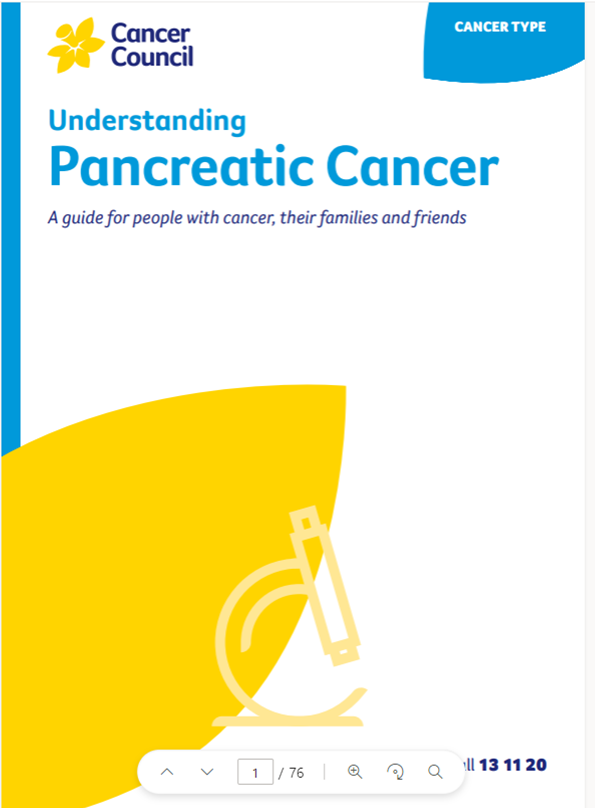- Home
- Pancreatic cancer
- Diagnosis
- Your health care team
Your health care team
Your GP will arrange the first tests to assess your symptoms. If these tests do not rule out cancer, you will usually be referred to a specialist, such as a gastroenterologist or surgeon. The specialist will arrange further tests.
If pancreatic cancer is diagnosed, the specialist will consider treatment options. Often these will be discussed with other health professionals at what is known as a multidisciplinary team (MDT) meeting. During and after treatment, you will see a range of health professionals who specialise in different aspects of your care.
To find cancer specialists, multidisciplinary teams and hospitals in NSW or ACT, you can visit the NSW Government website CanRefer.
Health professionals you may see
| pancreatic or HPB (hepato-pancreato- biliary) surgeon | operates on the liver, bile ducts, pancreas and surrounding organs |
| gastroenterologist | diagnoses and treats disorders of the digestive system; may diagnose pancreatic cancer, perform endoscopy, and insert stents to clear blocked bile ducts |
| medical oncologist | treats cancer with drug therapies such as chemotherapy, immunotherapy and targeted therapy (systemic treatment) |
| radiation oncologist | treats cancer by prescribing and overseeing a course of radiation therapy |
| endocrinologist | diagnoses and treats hormonal disorders, including diabetes |
| radiologist | analyses x-rays and scans; an interventional radiologist may also perform a biopsy under ultrasound or CT, and deliver some treatments |
| cancer care coordinator | coordinates your care, liaises with other members of the MDT and supports you and your family throughout treatment; care may also be coordinated by a clinical nurse consultant (CNC) or clinical nurse specialist (CNS) |
| nurse | administers drugs and provides care, information and support throughout treatment |
| palliative care team | a team of specialist doctors, nurses and allied health workers who work closely with the GP and oncologist to help control symptoms and maintain quality of life |
| dietitian | helps with nutrition concerns and recommends changes to diet during treatment and recovery |
| social worker | links you to support services and helps you with emotional, practical and financial issues |
| psychologist, counsellor | help you manage your emotional response to diagnosis and treatment |
| physiotherapist, exercise physiologist | help restore movement and mobility, and improve fitness and wellbeing |
| occupational therapist | assists in adapting your living and working environment to help you resume usual activities after treatment |
→ READ MORE: Making treatment decisions for pancreatic cancer
Podcast for people affected by cancer
Listen now
More resources
Prof Lorraine Chantrill, Honorary Clinical Professor, University of Wollongong, and Head of Department, Medical Oncology, Illawarra Shoalhaven Local Health District, NSW; Karen Baker, Consumer; Michelle Denham, 13 11 20 Consultant, Cancer Council WA; Prof Anthony J Gill, Surgical Pathologist, Royal North Shore Hospital and The University of Sydney, NSW; A/Prof Koroush Haghighi, Liver, Pancreas and Upper Gastrointestinal Surgeon, Prince of Wales and St Vincent’s Hospitals, NSW; Dr Meredith Johnston, Radiation Oncologist, Liverpool and Campbelltown Hospitals, NSW; Dr Brett Knowles, Hepato-Pancreato-Biliary and General Surgeon, Royal Melbourne Hospital, Peter MacCallum Cancer Centre, and St Vincent’s Hospital, VIC; Rachael Mackie, Upper GI – Clinical Nurse Consultant, Peter MacCallum Cancer Centre, VIC; Prof Jennifer Philip, Chair of Palliative Care, University of Melbourne, and Palliative Medicine Physician, St Vincent’s Hospital, Peter MacCallum Cancer Centre and Royal Melbourne Hospital, VIC; Lucy Pollerd, Social Worker, Peter MacCallum Cancer Centre, VIC; Rose Rocca, Senior Clinical Dietitian – Upper GI, Peter MacCallum Cancer Centre, VIC; Stefanie Simnadis, Clinical Dietitian, St John of God Subiaco Hospital, WA.
View the Cancer Council NSW editorial policy.
View all publications or call 13 11 20 for free printed copies.



